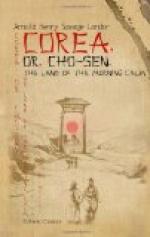Wherever one went in the Japanese quarter there was nothing but drink, and the main street was full of unsteady walkers.
Curiously enough, on proceeding a few yards further on towards the British Consulate, one came to the Chinese settlement, which was perfectly quiet, and showed its inhabitants not only as stern and well-behaved as on other occasions, but even, to all appearance, quite unconcerned at the frolic and fun of their merry neighbours. Here business was being transacted as usual, those engaged therein retaining their well-known expressionless and dignified mien, and apparently looking down disgusted upon the drunken lot, although prepared themselves to descend from their high pedestal when their own New-Year’s Day or other festival occasions should arrive.
I was much amused at a remark that a Chinaman made to me that day.
I asked him how he liked the Japanese.
“Pff!” he began, looking at me from under his huge round spectacles, as if he thought the subject too insignificant to waste his time upon.
“The Japanese,” he exploded, with an air of contempt, “no belong men. You see Japanese man dlunk, ol no dlunk, all same to me. He no can speak tluth, he no can be honest man. He buy something, nevel pay. Japanese belong bad, bad, bad man. He always speak lie, lie, lie, lie,” and he emphasised his words with a crescendo as he curled up what he possessed in the shape of a nose—for it was so flat that it hardly deserved the name; indeed, to give strength to his speech, he spat with violence on the ground, as if to clear his mouth, as it were, of the unclean sound of the word “Japanese.”
Not even in those days could the Chinese and Japanese be accused of loving one another.
The Chinese settlement is not quite so clean in appearance as the Japanese one, but if business is transacted on a smaller scale, it is, at all events, conducted on a firm and honest basis. Chemulpo has but few natural aptitudes beyond its being situated at the mouth of the river Han, which, winding like a snake, passes close to Seoul, the capital of the kingdom; and yet, partly because of its proximity to the capital, the distance by road being twenty-five miles, and partly owing to the fact that it is never ice-bound in winter, the town has made wonderful strides. As late as 1883 there were only one or two fishermen’s huts along the bay, but in 1892 the settlement contained a score of Europeans, over 2800 Japanese souls, and 1000 Chinese, besides quite a respectable-sized native conglomeration of houses and huts.




